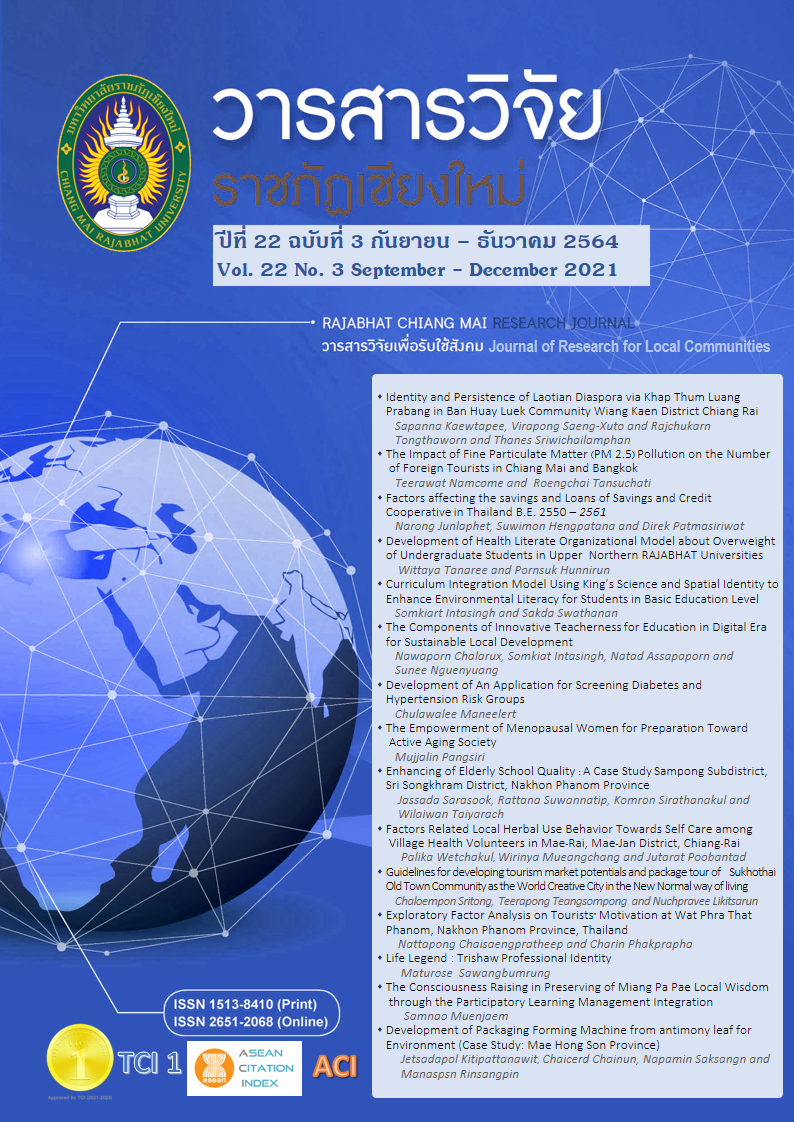Factors affecting the savings and Loans of Savings and Credit Cooperative in Thailand B.E. 2550 – 2561
DOI:
https://doi.org/10.14456/rcmrj.2021.247670Keywords:
Credit allocation, Savings mobilization, Financial ratiosAbstract
This study investigates the role of Savings Cooperatives in savings mobilization from members and credit allocation. Two modest objectives are: First, to analyze financial structure, financial ratios, and concentration among Savings Cooperatives compared by provinces and by regions. Second, to estimate and to test the relationship between savings mobilization and credit allocation by province against the set of explanatory variables such as GPP, real interest rates, and productive structure of province, based on 76 provincial panels over 12 years (BE2550-2561) using Generalized Least Squares regression method. Among our findings are 1) a high concentration of savings mobilization is found in Bangkok; 2) a note on regional variations, for instances, the northern members save relatively more than the northeast; 3) provincial savings from Savings Cooperatives is positively related to GPP, share of the service sector, real interest rates and members, contradict to share of the industry sector is found negative.
Downloads
References
Armendáriz, B., & Morduch, J. (2010). The economics of microfinance. Cambridge. Massachusetts: MIT press.
Assawawongsathien, S., Srichat, K., & Nudam, R. (2017). The Risk of the Cooperative System and Guideline for the Reformation and Supervision. In: Bank of Thailand. Focused And Quick (FAQ), 114, 1-20. (In Thai)
Cheevasittiyanon, K. (2018). Authorities launch investigation into alleged corruption at Loei Police Coop. National News Bureau of Thailand. Retrieved from https://www.bangkokpost.com/thailand/general/1415191/savers-call-in-dsi-over-rail-co-op-deal (In Thai)
Fonteyne, W. (2007). Cooperative Banks in Europe--Policy Issues. International Monetary Fund.
Greene, W. H. (2000). Heteroscedasticity Econometric Analysis. (4thed.). Upper Saddle River, NJ: Prentice-Hall Inc, 499-524.
ICA. (1996). Background Paper to the Statement on the Cooperative Identity. Retrieved from https:// www.academia.edu/6524851/Background_Paper_to_the_Statement_on_the_Cooperative_Identity (In Thai)
Kilenthong, W. T. (2012). Factors Driving Total Factor Productivity after the Financial Crisis 1997 Bangkok. Thailand Science Research and Innovation (TSRI). (In Thai)
Kitbumrungrat, K. (2016). An Analysis of Data Financial Raito Factors of Agricultural Cooperatives and Non Agricultural Cooperatives in 2015. Veridian E-journal Science and Technology Silpakorn University, 3(6), 29-42. https://ph01.tci-thaijo.org/index.php/VESTSU/article/view/75823 (In Thai)
Kongoro, E. A. (2015). Factors Affecting The Supply Of Housing Credit: A Study of Financial Institutions. University of Nairobi.
Korwijit, S., & Banchuenvijit, W. (2018). Factors Affecting Amount of Deposits Evidence from Siam Commercial Bank Public Company Limited. Paper presented at the The 13th RSU National Graduate Research Conference.
Maddala, G. S., & Wu, S. (1999). A comparative study of unit root tests with panel data and a new simple test. Oxford Bulletin of Economics and statistics, 61(S1), 631-652. DOI: https://doi.org/10.1111/1468-0084.0610s1631
Mmari, G. A., & Thinyane, L. C. (2019). Analysis of Factors Influencing Financial Performance of Savings and Credit Co-operative Societies in Lesotho: Evidence From Maseru District. International Journal of Financial Research, 10(2), 121-136. DOI: https://doi.org/10.5430/ijfr.v10n2p121
Mushtaq, S., & Siddiqui, D. A. (2017). Effect of interest rate on bank deposits: Evidences from Islamic and non-Islamic economies. Future Business Journal, 3(1), 1-8. DOI: https://doi.org/10.1016/j.fbj.2017.01.002
Nilbai, T. (2016). Structures and Determinants of Commercial Bank Deposits and Loans by Provinces. Journal of Economics Ramkhamhaeng University, 2(1), 102-120. http://www.ecojournal.ru.ac.th/index.php/journals/viewPage/16 (In Thai)
Périlleux, A., Vanroose, A., & D' Espallier, B. (2016). Are Financial Cooperatives Crowded out by Commercial Banks in the Process of Financial Sector Development?. Kyklos, 69(1), 108-134. DOI: https://doi.org/10.1111/kykl.12105
Pitipunya, R. (2014). Savings and Credit Cooperative: An Instrument for Economic and Social Development. Bangkok: Kasetsart university.
Ratanabanchuen, R. (2017). Financial Risk Assessment and Good Governance for Risk Management of Savings and Credit Cooperative in Thailand. Bangkok: Thailand Science Research and Innovation (TSRI).
Stepanyan, V., & Guo, K. (2011). Determinants of bank credit in emerging market economies. International Monetary Fund.
Stevens, J. (1996). Applied multivariate statistics for the social sciences. (3rd ed.). Mahwah, N.J. : Lawrence Erlbaum Associates.
Tapaneeyaworrawong, P. (2017). A Factors Analysis of Financial Stability of Saving Cooperative the area of Northern Part of Thailand. Journal of Logistics and Supply Chain College, 3(1), 108-119. http://ojslib3.buu.in.th/index.php/business/article/view/5869 (In Thai)
Wisaisri, J., Kangwanpornsiri, K., & Bhisalbutra, L. (2011). A Study of Airborne Division’s Savings Cooperative Limited on Solvency and Risk Management. Paper presented at the The 1st STOU Graduate Research Conference, Sukhothai Thammathirat Open University. (In Thai)
Yakubu, I. N., & Abokor, A. H. (2020). Factors determining bank deposit growth in Turkey: an empirical analysis. Rajagiri Management Journal.
Zikalala, M. J. (2016). The role of savings and credit cooperatives in promoting access to credit in Swaziland. University of Pretoria.
Downloads
Published
How to Cite
Issue
Section
License
1. Articles, information, content, images, etc published in the “Community and Social Development Journal” are copyrighted by the Community and Social Development Journal, Chiang Mai Rajabhat University. In order to properly distribute the articles through print and electronic media, the authors still hold the copyright for the published articles under the Creative Commons Attribution (CC BY) license, which allows the re-distribution of the articles in other sources. References must be made to the articles in the journal. The authors are responsible for requesting permission to reproduce copyrighted content from other sources.
2. The content of the articles appearing in the journal is the direct responsibility of the article authors. The editorial board of the journal does not necessarily agree with or share any responsibility.














